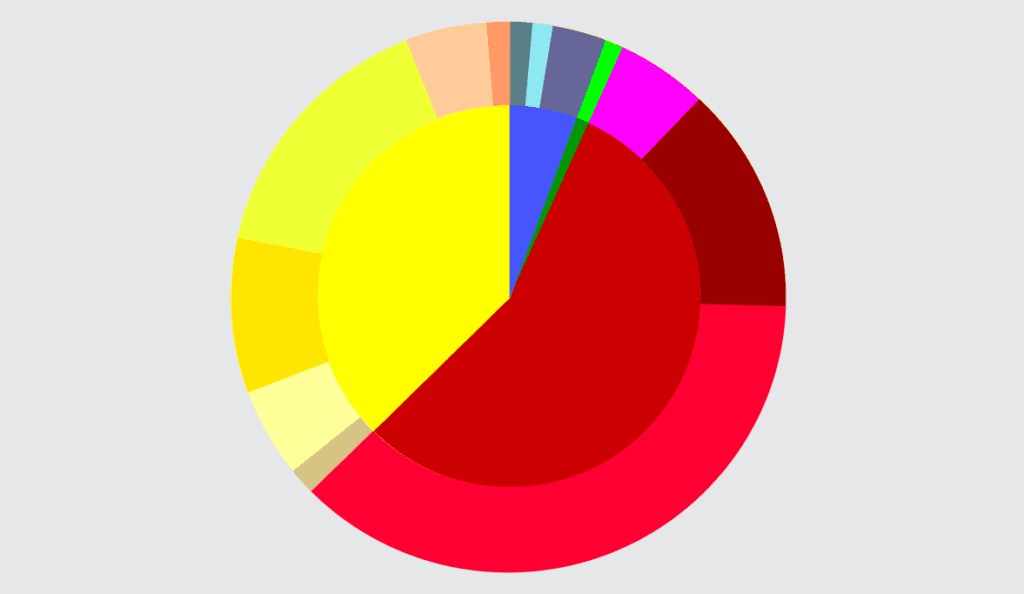The answer probably depends more on your beliefs than it does on your financial circumstances.
According to the fitness app Strava, every year starts with a rush of new users tracking their runs. Then, not quite two weeks later, tracking usage drops off precipitously. As a result, Strava has declared January 12 to be the most popular day to give up on New Year’s resolutions.
U.S. News & World Report, allowing us a bit more credit, still says that 80 percent of people give up on their resolutions by mid-February. A mere 8 percent reportedly achieve lasting success.
Resolutions come in many forms, of course – eating better, working out, reading more, getting more sleep – yet our inability to follow through seems to apply to all of them.
Financial resolutions are a case in point. Every year, Fidelity releases their “New Year Financial Resolution Study,” outlining the results of a year-end survey of thousands of investors regarding their resolutions.
The most recent study (from January 2020) lists the top three resolutions as:
- Save more: 53%
- Pay down debt: 51%
- Spend less: 35%
Of course, this was pre-pandemic. It will be interesting to see what the 2021 study will look like. I suspect that the top three resolutions will remain unchanged, as they have pretty much every year. If anything, the pandemic seems to have reminded us that it pays to be prepared for financial contingencies, and has renewed an overall interest in managing our finances wisely.
The same Fidelity study includes a section where people who kept their resolutions the previous year share the secret of their success. It turns out that the “secrets” aren’t very surprising:
- set specific and realistic goals,
- track your progress, and
- give yourself small rewards along the way.
But if it’s really that simple and obvious, why is it still so hard for so many people? Why will 80 percent of us throw in the towel? Other factors are obviously at work here.
So rather than write another article about which financial resolutions you should adopt in 2021, I’d like to offer some of my learnings about why certain individuals achieve their financial goals more readily, while the other 80 percent of us struggle to stay on track. These are the real “secrets” that you should be paying attention to if you want to set yourself up for a better chance of success this New Year.
How to Create Lasting Change in Your (Financial) Habits
Long-term financial success is seldom the result of a single event or lucky break. It’s almost always the result of years of small steps and purposeful decisions. In other words, it’s not about what you know, it’s about how you behave. If you’ve been trying to pay off your credit cards or stick to a budget for a long time with little to no success, it’s not because you don’t realize these are good things to do.
True and lasting change comes from identifying the why of our behaviors, and then working from there. And though trying to understand our own motivations and behavior requires real work, it’s where change begins.
There are typically three aspects to creating lasting change in our lives:
- An awareness of the “scripts,” or beliefs, that we replay over and over in our heads and that we unknowingly accept as objective “truth,”
- An honest assessment of what we truly want – not just what we “should” want – and how our current behavior benefits us, and
- An understanding of the process of change itself, including a plan to make, consolidate, and practice new behaviors until they “stick.”
Let’s tackle these aspects one at a time.
What Do You Really Believe About Money?
In their seminal book Facilitating Financial Health, Klontz, Kahler & Klontz introduced the concept of “money scripts.” [1] Money scripts are “unconscious beliefs each of us has developed concerning money and life.”
We all create these “rules of thumb” about the world and about life as a result of the people we know and the personal and economic events we experience during our formative years.
It’s not just about your dad telling you that “a penny saved is a penny earned.” Money scripts can be formed in many ways:
- You had friends with a nicer house and clothes than you had, and you felt “inferior” because of these differences.
- Your household’s religious beliefs reinforced negative views of people with money.
- You experienced the loss of a parent during your childhood and internalized a deep sense of economic precariousness.
- You saw your parents fight about money a lot, or stress about paying bills each month. Money therefore always seemed to be a source of stress, worry, and conflict.
And once we draw these conclusions for ourselves, we tend to forget where they come from. We simply assume that they are true – like the fact of gravity or the wetness of water. Moreover, we assume that they apply universally – to all people and at all times – and forget that their relevance, though real, may be limited in our present time and current circumstances.
Ask anyone in my line of work why they became a fiduciary financial advisor, and they will probably tell you one or two stories about their history that provide emotional background to their career choice. Their parents may have struggled to make ends meet and so they vowed to do better themselves. Or life circumstances may have encouraged them to engage with money early in their life in a way that others didn’t.
My childhood falls under the second category. When I was six years old, my German grandfather took me to the county fair. I had a bit of money I wanted to spend it playing the carnival games there. But Grampa took me aside and kindly told me that it would be smarter if I saved my money, so I could spend it on something nicer in the future.
The next day, Grampa took me down to the local bank, opened up a “passbook savings account” for me, and showed me how to save. Because my grandfather was such an important and beloved figure in my youth, I’ve experienced saving as an act of security and love ever since. It was only later that I discovered that saving money carries a negative connotation for many people because they experience it as deprivation or denial of their current desires.
Yet like many good things, there can be a downside to even healthy behaviors. When my father (who also picked up the saving habit from his father) was in his late 80s, I discovered that he was still “putting money aside for later,” even though he had enough and could have used the extra cash flow. The bottom line here is this: All habits – even fundamentally good ones – can benefit from healthy scrutiny on a periodic basis.
[1] Klontz, Brad, Rick Kahler, and Ted Klontz. Facilitating Financial Health: Tools for Financial Planners, Coaches, and Therapists. Erlanger, KY: The National Underwriter Company, 2016.
Understanding “Money Scripts”
It’s important to reiterate that money scripts are not necessarily “right” or “wrong.” It’s just that most scripts based on childhood experiences tend to be delimited in time or context. For that reason, money scripts tend to be either incomplete or too inflexible if applied universally. Yet, unless we have examined the experiences that led to our specific scripts, we all naturally assume that these are universal – and absolute – truths.
Money scripts come in many forms, and they’re not all about saving money. The Klantz Kahler Institute compiled the top 10 most popular money scripts. See if any ring true for you:
- More money will make things better.
- Money is bad.
- I don’t deserve money.
- I deserve to spend money.
- There will never be enough money.
- There will always be enough money.
- Money is unimportant.
- Money will give me meaning.
- It’s not nice (or necessary) to talk about money.
- If you are good, the universe will supply all your needs.
“More money will make things better” may be true in certain contexts, but if that belief is unconsciously driving your financial decisions, it might explain why you would, for example, give up on a resolution to stick to your budget, opting instead to try to solve all your money issues with additional sources of income.
Discovering your beliefs about money can be difficult, but here are a few questions that can help you get started. For example, do you believe that:
- Wealthy people are bad?
- Wealthy people are better than less wealthy people?
- Being frugal makes you a good person?
- Being frugal means you can’t enjoy life?
- Hard work will inevitably bring prosperity?
- Poor people are lazy?
Once you’re aware of the underlying beliefs driving your financial decisions, now it’s time to look at how you interact with them, and also how they can either support or inhibit the change you want.
What (More) Is In It For You?
We all want to be richer (and thinner), so why isn’t that motivation enough to facilitate change?
The truth of it is that we struggle with change because we get something out of not changing. After all, we are the way we are for a reason.
I had a client once who was struggling mightily with the goal of saving for retirement. He had a healthy income, and we talked openly and rationally about the fact that he wanted to stop working at some point and spend more time with his family.
Yet he kept giving away his money and finding reasons to put off saving. What was going on?
It turned out that this client grew up in an environment where money was considered “evil.” He strongly believed that only “bad” people have money. And since he wanted more than anything to be a “good person,” every time he acquired more money than he needed in the short term, he felt bad, unvirtuous – even “dirty.”
None of the rational discussions we had about this mattered. He felt how he felt. Nothing I could do or say, no reasoned analysis or argument, could break through his deeply held belief that being “poor” made him virtuous and being “rich” would make him a bad person.
The situation finally was resolved, but only after a higher power intervened. My client’s pastor eventually figured out what was happening and counseled my client to save for a comfortable – though not lavish – retirement.
I was a financial authority in his life, and I had told him every way I knew how that saving for retirement was the right choice, but it never made a difference. Because having money was a moral issue in his mind, change had to be initiated by a moral authority, not a financial professional.
In order to want to change, we have to do two things:
- Identify the belief(s) we’re clinging to that keeps us from changing. In other words, understand what are you getting out of not
- Recognize the greater benefits you can find by changing your behavior.
Deep down, we all recognize that we will get something out of change. We know we would be less anxious if we didn’t owe so much on our credit cards. We know we would have fewer sleepless nights – and a more secure future – if we saved more for retirement.
The problem is that the joy of shopping or the status that we feel from acquiring expensive and showy items is more familiar and immediately satisfying. Yet until we grapple with how we’re reacting to our own money beliefs – and until we confront whether we think those beliefs are still valid – we are all at the mercy of our history and unconscious beliefs.
Self-awareness requires that we spend some time examining ourselves honestly and with an acceptance that we may not be the in-control creatures we think. And that’s okay. None of us is perfectly in control of our lives. The sooner we can admit it, the sooner we open ourselves up to grappling with the financial tasks that we set ourselves.
Prepare for the Difficult Process of Change
Once we begin to understand our own motivations and values – and that comes in waves – we’re in a position to actually begin a process of change.
In Facilitating Financial Health, the authors give a clear roadmap to how regular change becomes lasting change. I say “clear,” but that should not be taken to mean that it is easy. In fact, they call these steps “The Difficult Process of Change.”
Studies show that only about 20 percent of people are actually ready for financial change. The rest of us may recognize a need to change – and some of us may even know exactly how to change – but we just go on living the way we always have.
For most people, therefore, change is a process and not an event. It’s a progression whose individual steps build on the previous ones. So don’t expect that you’re going to change your life between the 1st and the 12th of January. However, with honesty, thoughtfulness, and a little help along the way, anyone can make it through all of the six steps to change that Klontz & Kahler outline and bring about lasting change in their own lives. Those steps are:
- Pre-Awareness – This step falls under the category of “becoming more self-aware.” At this stage, you may not even recognize you have a problem. You may be bankrolling your adult children’s lifestyle or sacrificing your retirement plan to fund your children’s education, but it doesn’t strike you as a problem until something – or someone – comes along to change your perspective.
- Awareness – Here, you recognize that there is a problem, and that your own behaviors and beliefs might play a larger role in it than you thought. You are still not yet ready to take action. Your awareness of the problem is still new enough that you are more readily able to see it in others’ lives than your own. You’re not ready to take responsibility for it in your own life just yet. As you become more aware of the problem, your contemplation should eventually turn inward.
- Preparation – At this point, you’re getting ready to change. You’re no longer thinking about the problem; you’re proactively considering solutions. Above all, you begin thinking about how your life will improve after the problem is solved. You begin to recognize that you will get more out of changing than not changing, and that’s the tipping point.
- Action – You’re taking practical steps to affect change. Maybe you cut up or your credit cards, or you sit down with a financial advisor and create a plan for building your retirement savings. This is an essential step, indeed, but one of the main reasons New Year’s resolutions fail is because they often jump straight to this fourth step without setting up the firm foundation found in the first three steps.
- Maintenance – At this point, the change is becoming your new way of life. You’re making additional adjustments to support this new direction. Relapsing is common here; don’t let it derail your plans! One of the most common ways resolutions fail is when you slip up once and then give up entirely as a result. Expect to relapse; that’s normal. One instance doesn’t define a pattern, or your life. Get back in the saddle and keep riding.
- Completion – This phase isn’t really “the end,” but it is very good news: You’ve achieved lasting change. Better financial decisions have become such a common daily occurrence that you no longer need to think about them very much.
In conclusion, resolutions aren’t bad. In fact, they can be very good. Making better financial decisions is a wise goal that we should all strive to achieve.
But if you don’t want to be part of the 80 percent who fail, then I would encourage you to start with some serious thought about yourself, your underlying beliefs about money, your motivation and values, and the life and financial outcomes that you most want to create for yourself and your loved ones.
Do you want to talk to someone about how you can create lasting change in your financial life? Reach out to your own financial advisor or to us at Griffin Black. We’re here to help guide clients toward their financial goals.
Here’s to real change in 2021 and beyond!
Image by Brian A Jackson from Shutterstock



